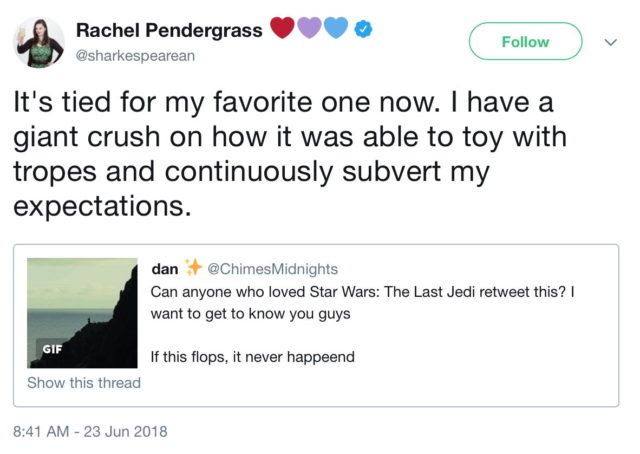I’m not a fan of Star Wars: The Last Jedi, but lots of people are. I find this odd, but enh, I don’t have a deep love of Star Wars generally. Still, sometimes people I follow post how much they like this film and it makes me think:
Toy with tropes? Subvert expectations? Did we see the same film? I found its storytelling ham-handed and elliptical, struggling to find its meaning and message. But Rachel’s hardly the only person who sees meaning in what I see as clumsiness. Is this just a matter of different peoples’ minds seeing different patterns in the same content?
I’m not going to try to answer that question here (speaking of elliptical). Rather, her tweet made me think further about what sort of meaning there is for me in the film, inasmuch as I think Star Wars is not generally a deep franchise, and it’s generally pretty simplistic in both world building and storytelling. This led me in a roundabout way (which is code for “I don’t remember all the details of how I got to this point”) to thinking that the end game for this trilogy could be something different from what people are expecting. To wit:
The Force Awakens contained a lot of beats that seemed lifted from the original Star Wars, and The Last Jedi drew some comparison to The Empire Strikes Back, which perhaps leads people to conclude that the next film will evoke Return of the Jedi, and in particular an expectation that the trilogy is going to wrap things up in a fairly conclusive manner. After all not only did Jedi do so, but there’s likely still a lot of fanthink that these three movies are going to finish off the 9-film arc that George Lucas had teased decades ago.
But it’s pretty clear to me that Disney has strayed far from that path already, since Force and Last Jedi build upon, but don’t really continue, the arc of the six Lucas films. So what if the goal here is to not evoke the closure of Return of the Jedi?
What if the endpoint is instead to have our heroes suffer a crushing and total defeat, as happened at the end of the prequel trilogy?
After all, we didn’t really “get to” experience the shock of the heroes utterly losing in the prequel trilogy, because we all knew it was coming, but this is an opportunity to surprise and shock the viewers.
I’m skeptical that this is what would really happen, since it’s not very Disney-esque, and J.J. Abrams’ work doesn’t indicate that this is the direction he’s likely to take the final film. But it could be quite effective, and could lead in to another trilogy, maybe a couple more decades down the timeline, with a new group of characters trying to put things back together. (Finn: “It’s all true: Kylo Ren, Poe Dameron, the Skywalkers, all of it.”)
The Last Jedi ended on a pretty grim note, so how much worse can things get? Well, just as one possibility, which seems entirely plausible based on how the story’s been going, I have two words:
Empreror Rey.

